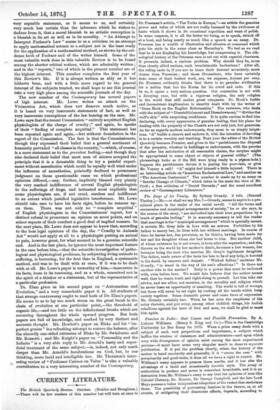The Days of his Vanity. By Sydney Grundy. 3 vols.
(Samuel Tinsley.)—Mr.—or shall we say Mrs. ?—Grundy, seems to aspire to a pro- minent place in the ranks of the social revolt. "All the forms and ceremonies and municipal arrangements of society," he or she saya, in the course of the story, "are shrivelled into their true proportions by a touch of genuine feeling." It is scarcely necessary to tell the reader that marriage is the " municipal arrangement "which is specially meant. A certain Mr. Gray falls in love with an actress. Forbidden by his father to marry her, he lives with her without marriage. In course of time he leaves her, due provision, as he thinks, having been made far her and the daughter whom she had borne to him. But another child, of whose existence he is not aware, is born after the separation; and she, thrown on the world by her mother's death, becomes a lost woman, her betrayer being the man who marries Mr. Gray's legitimate daughter. The father, made aware of the facts too late to be of any help, is hurried to his death by remorse and despair. "Wicked father," exclaims Mr. Grundy, "to stand in the way of his son's affections!" Is there not another side to the matter? Duty is a power that must be reckoned with, even before love. We would fain believe that the author means well, that he wants truth and right-doing to prevail. Let him take our advice, and see allies, not enemies, in the morality and religion which he never loses an opportunity of assailing. The world is full of wrongs, but these will never be set right by cutting all the bonds which keep society together. Some dramatic power and some force of expression Mr. Grundy certainly has. When he has seen the emptiness of his noisy rhetoric, and put away, among other childish things, his foolish rebellions against the laws of God and man, we shall be glad to meet him again.


































 Previous page
Previous page